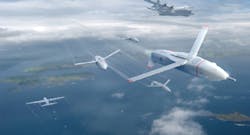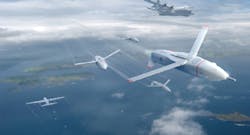DARPA adds two companies to OFFSET swarm reconnaissance drone research project
ARLINGTON, Va. — U.S. military researchers are adding defense contractors to an effort focused on developing ways to swarm unmanned vehicles inside cities and towns to enhance reconnaissance capabilities and identify threats to U.S. and allied military forces from standoff ranges.
Officials of the U.S. Defense Advanced Research Projects Agency (DARPA) in Arlington, Va., are choosing Lockheed Martin in Bethesda, Md., and Charles River Analytics in Cambridge, Mass., to take part in the OFFensive Swarm-Enabled Tactics (OFFSET) program.
Lockheed Martin and Charles River Analytics join OFFSET phase-one contractors Raytheon BBN Technologies in Cambridge, Mass., and Northrop Grumman Corp. in Linthicum, Md., on the project to develop a game-based open architecture to develop and test swarm tactics for specially designed swarming unmanned systems in the air and on the ground for urban operations.
Military researchers are expanding a project to develop enabling technologies for future swarming unmanned aerial vehicles.
Lockheed Martin won a $363,505 based contract with a $135,286 option, and Charles River Analytics won a $488,063 base contract with a $148,947 option.
The two companies are considered to be OFFSET “sprinters,” or experiment participants in the OFFSET program, which are doing rapid technology development and integration of unmanned swarm technologies.
Raytheon BBN and Northrop Grumman, meanwhile, serve as OFFSET systems integrators, and are designing open-systems, game-based architectures to run swarm tactics application scenarios. These game-based architectures will have immersive interfaces for collaboration among teams of humans and swarm systems, and a physical testbed to validate developed capabilities.
Lockheed Martin and Charles River, as OFFSET sprinters, will work with Raytheon BBN, Northrop Grumman, or both, to create and test their own swarm tactics and enabling technologies.
DARPA researchers expect that such swarm systems may lead to new enabling technologies for swarming unmanned vehicles, such as distributed perception, robust and resilient communications, dispersed computing and analytics, and adaptive collective behaviors.
Swarming unmanned vehicles may increase standoff distances for detection and identification of potential dangers, offer increased safety and surveillance, and enhance intelligence preparation of the battlespace, DARPA officials say.
The OFFSET program focuses on two key areas to increase the effectiveness of small-unit combat forces operating in the urban environment: swarm autonomy for agile, complex, collective behaviors for intelligent movement, decisions, and interactions with the environment; and human-swarm teaming, enabling swarm commanders to infer, interact with, and influence swarm system behaviors.
Emphasis is on open software and systems architectures, game software design and game-based community development, immersive interactive technologies, and robotic systems integration and algorithm development for distributed robotics.
For more information, visit Lockheed Martin online at https://lockheedmartin.com, Charles River Analytics at www.cra.com, or DARPA at www.darpa.mil.

